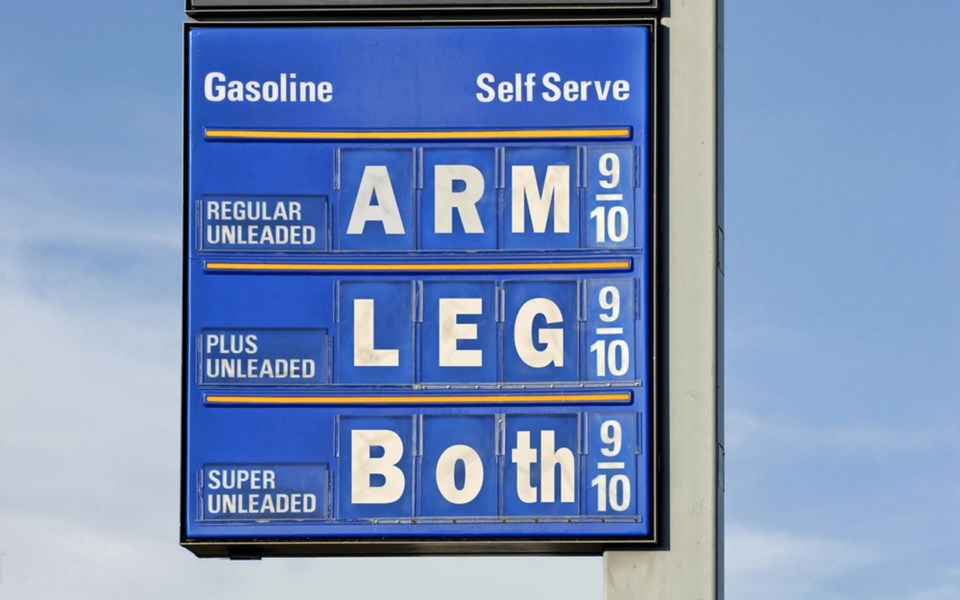It is so frustrating to pull up to the pump at our local gas stations and know that the price we pay hasn't really got much to do with the actual cost of oil.
The insane cost of gas per-litre in the Lower Mainland and up and down the Sea to Sky corridor in May—$1.70 a litre—had lots of people talking and was, in part, the catalyst for the provincial government's decision to call an inquiry into the situation. We should see the results in August.
The inquiry has already run into problems with the largest of Canada's oil companies refusing to share pertinent information on pricing for fear they would compromise their competitive positions.
In calling the inquiry, Premier John Horgan said gas and diesel price increases were, "alarming, increasingly out of line with the rest of Canada, and people in B.C. deserve answers."
He has tasked the British Columbia Utilities Commission (BCUC) with overseeing the inquiry. A three-member panel chaired by CEO David Morton has already begun its oral proceedings.
The oil companies and the Commission are working out how to get to some answers and protect the confidentiality of oil company information.
No one imagines that the final report will come up with simple answers or simple solutions. This is too complicated an issue that is poorly understood in general.
But the residents of B.C. deserve some explanations. Many residents want the province and indeed the country (and the world) to move away from its reliance on fossil fuels, and to some extent, there is acceptance that this change will likely mean higher prices at the pump.
But what we are experiencing now feels arbitrary.
Of course, it's not. At its most basic level, it is supply and demand and in a real sense is rooted in a lack of competition. Gas companies and stations have customers where they want them. They can charge what they want and we still fill up. Corridor commuters have little choice as no real transit option exists.
There are many intersecting realities in B.C. that do not exist in other places in Canada, except for perhaps the very far north. We only have two refineries in the province, and much less refined oil is delivered here from Alberta than say a decade ago by pipeline (more expensive rail and truck deliveries are on the rise). B.C. has asked the National Energy Board and Prime Minister Justin Trudeau to up the amount of refined oil sent to B.C. by pipeline, but no word on that so far. And with our strained relations with Alberta, that is unlikely to be an easy fix.
B.C. also gets refined gasoline from Washington state and Oregon—so, as a province, we are at the mercy of suppliers.
But that still does not explain why in Whistler we are paying close to the same as those in the Lower Mainland who have the added 17-cent Translink tax to pay (that's now gone up to 18.5 cents as of July 1). Nor why gas in Pemberton is consistently cheaper—sometimes by as much as nine cents a litre!
Our MLA, Jordan Sturdy, compared gas prices at Chevron stations in Whistler, Squamish and North Vancouver on Saturdays and Wednesdays, dating back to late February. Over the course of roughly 16 weeks ending June 5, Whistler paid, on average, 16.8 cents more per litre than North Vancouver, and 10.4 cents more than Squamish—despite the TransLink tax added on for Vancouver drivers.
Some of the questions the inquiry is asking might help explain this such as, the capacity and costs of using the Trans Mountain Pipeline, whether refineries co-ordinate with one another to plan for maintenance repairs and shutdowns, and whether companies divert refined product from B.C. when gas prices are low, whether it's competitive or not, how the prices are set, why the prices are different in B.C. and why they fluctuate more than they do in other parts of Canada.
A report by the Canadian Centre for Policy Alternatives said that of the 55-cent-a-litre rise experienced in Vancouver in the past three years, 6.3 cents could be attributed to tax increases, 28 to the rising cost of oil, 2.6 to higher gas-station profits and 18 to higher refining margins—which are the difference between the wholesale price for fuel and the retail price less tax. Refineries' margins here are much higher than in Toronto and Calgary. So, really, it's all about oil companies getting as much as they can from the consumer.
(Said Husky in its first quarter earning results: "The structural transformation of our business over the past several years is paying off. We are now realizing higher per-barrel margins across the Company." Funds from operations were $959 million, up 64 per cent over the previous quarter and seven per cent higher than Q1 2018.)
The National Energy Board found that the refining margin on regular gasoline in Vancouver in April averaged 52.1 cents per litre, roughly double the Canadian average refining margin. The retail margin was a further 10.5 cents a litre, roughly 54 per cent higher than the Canadian average, according to the NEB.
With the average household spending $4,000 a year on gas, these are just more reasons to look at buying an electric car.




